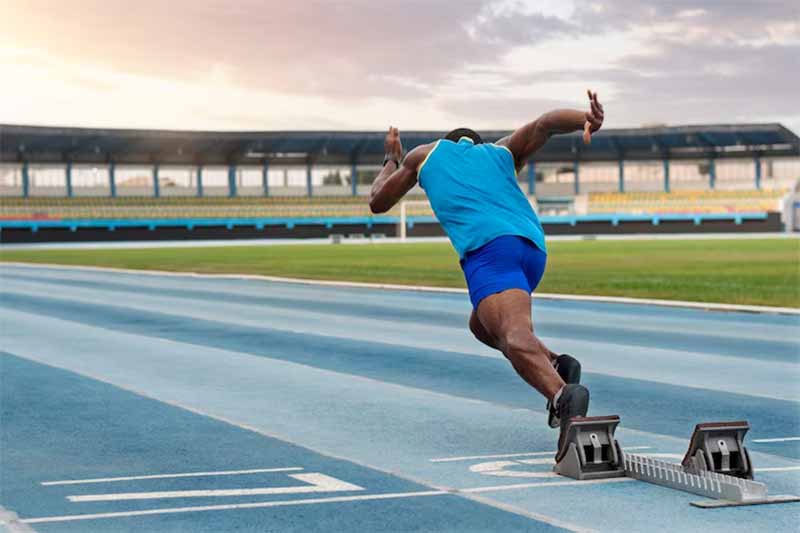No products in the cart.
CBD Vape for Athletes : Can Vaping CBD Help Exercise and Recovery? Leave a comment
CBD Vape for Athletes : Can Vaping CBD Help Exercise and Recovery? CBD has many benefits, from improving sleep quality to lessening anxiety. However, did you know it can also help exercise and sports recovery? The popular compound is part of a growing market for fitness enthusiasts and athletes.
Athletes put a lot of stress on our bodies, to positive and negative effect. Training stress stimulates adaptation and increased performance, but physical trauma and prolonged wear and tear also lead to injuries and pain. Current methods of pain management are effective, but they’re also killing people. In search of improved sports recovery and safer pain relief, many people are asking about cannabidiol or CBD for athletes. Should you?
Both recreational and competitive athletes increasingly look to cannabidiol for supporting wellness routines given its enhanced safety profile and research beginning to validate and confirm the benefits aiding performance, recovery, and overall exercise and recovery.
CBD Vape for Athletes : Can Vaping CBD Help Exercise and Recovery?
Maximizing these upsides requires optimizing delivery methods and timing strategically aligned to individual sports demands and preferences. CBD vape offers rapid relief from occasional discomfort or inflammation following strenuous workouts and sporting events due to its immediate onset time. Let’s jump into what the research says.
Is CBD legal for athletes?
Yes. Starting at the beginning of 2018, the World Anti-Doping Agency (WADA) removed CBD from the list of prohibited substances – in or out of competition. (Here is the 2020 WADA Prohibited List.) The US Anti-Doping Agency (USADA) did the same, and they provide a “Marijuana FAQ” page to clarify the rules. There is an important caveat: ONLY CBD was removed from the prohibited list. The psychoactive component of marijuana, THC, is still prohibited in competition, as are synthetic cannabinoids. The specific wording is: “All natural and synthetic cannabinoids are prohibited, e.g.: In cannabis (hashish, marijuana) and cannabis products. Natural and synthetic tetrahydrocannabinols (THCs). Synthetic cannabinoids that mimic the effects of THC. Except: Cannabidiol.”
Interestingly, WADA set a urinary threshold of 150 nanograms per milliliter for THC, which is substantially more lenient than the previous limit of 15 nanograms per milliliter. The higher threshold is designed to lower the risk of an athlete testing positive due to casual use outside of competition. A USA Today article in 2016 quoted Ben Nichols, a spokesperson for WADA as saying, “Our information suggests that many cases do not involve game or event-day consumption. The new threshold level is an attempt to ensure that in-competition use is detected and not use during the days and weeks before competition.”
As for legality outside of sports, that’s a whole different matter. The federal, state, and local legality of cannabis and related products is constantly evolving. Check the laws in your area.
CBD for Focus
One of the most common reasons people use a dry herb vaporizer is to calm the mind. This benefit helps with their focus in two ways. First, it reduces anxiousness and brings your mind back to the task at hand. Second, it works to relax the mind, improving performance and reducing the risk of injuries. When you’re not paying attention to the weights you’re lifting, to the road while out for a jog, or against an opponent on the field, your chances of getting hurt increase. A small dose of CBD daily may prevent the mental games that can take you out of the winner’s circle.
CBD For Sports Recovery
Getting back into training is a significant challenge for athletes after a competition. If they rest too early, the muscles can stiffen and become more prone to injury in later workouts. Rest too late, and you risk tearing a muscle or suffering from overworked joints. CBD’s anti-inflammatory properties make it an ideal choice for speeding up recovery time.
Whether you choose a topical to massage into your muscles and joints after a long run, challenging workout, or tough competition, science backs the wellness properties of the hemp compound. CBD works with your body’s endocannabinoid system to target pain receptors and soothe away these everyday aches and pains.
CBD Vape for Athletes : Can Vaping CBD Help Exercise and Recovery?
CBD For Sleep
A considerable slice of recovering after a strenuous leg day or lifting session to build your biceps is sleep. Your body needs seven to nine hours of quality rest to recover from these workouts. Additionally, if you’re not getting enough sleep or your circadian rhythm is disrupted, it will take longer for muscles and joints to heal. CBD helps with the body’s natural sleep cycle, increasing your time in the therapeutic state of REM (rapid eye movement). This increased rest helps you recover faster and better.
Is CBD Safe For Athletes?
For CBD and sports recovery, the compound is praised for its safety. The World Anti-Doping Agency (WADA) still prohibits THC but has recently approved the non-psychoactive CBD for safe use for all caliber athletes. So, if you’re playing in a competition, you’ll want to ensure the cannabis in your herb vaporizer contains CBD only. These are just as effective as the full spectrum, but they won’t cause you to lose your ability to play.
CBD has many uses and benefits, but one of the most exciting is its ability to help with exercise recovery. Whether you want a topical for sore muscles or just need something that will calm your mind so you can focus on lifting weights without worrying about getting hurt, CBD may be what you need.
CBD Basics
Athletes can legally consume cannabidiol, but what is it, what does it do, and why would you use it?
To begin with, cannabinoids already exist in your body. Scientists have identified what they call the endocannibinoid system (ECS) that modulates the activity of neurons. (9) Cannabidiol (CBD) is a phytocannabinoid found naturally in the cannabis plant. Unlike THC, which is also found in cannabis, CBD is not psychoactive.
Beyond that, scientists understanding of how the ECS works and how CBD influences it is still evolving. For a long time, research in this area was hard to complete due to the legal status of marijuana. However, based on recent studies and 2018’s The Essentials of Pain Medicine, Fourth Ed., here are the basics (5).
Within your nervous system, two endocannabinoids (2-AG and EAE) are produced in postsynaptic neurons (downstream) and released into the synapse. They bind to CB1 and CB2 receptors on the presynaptic neuron (upstream) and act to inhibit the release of certain neurotransmitters. For instance when CBD is used to treat epilepsy, it may reduce seizure activity by – in part – reducing the buildup of glutamate, an excitatory neurotransmitter.
CB1 receptors are found throughout the brain, spinal cord, and other tissues. CB2 receptors are as well, but more of them are found in immune system tissues. CBD binding to CB1 receptors has a greater effect the central nervous system, and CBD binding to CB2 receptors has a greater effect on reducing inflammation.
The primary purpose of the ECS appears to be maintaining homeostasis, which it does by keeping neurotransmitter levels in check. Consuming CBD could be thought of as supplementing or increasing the activity of your body’s existing endocannabinoid system.
As an athlete you apply greater stress to your body, leading to pain and inflammation greater than what your endocannabinoid system can handle. Adding exogenous CBD may help this overloaded system get your neurotransmitters back under control and help athletes maintain homeostasis.
CBD Vape for Athletes : Can Vaping CBD Help Exercise and Recovery?
5 Benefits of CBD for Athletes
1. Relieve Pain
Studies have shown cannabis (mostly THC and far less CBD) is effective for reducing pain, including musculoskeletal pain from exercise, as well as stiff joints. (5) There is little research on CBD alone or a 1:1 ratio of THC to CBD. This is an area where anecdotal evidence and biological plausibility are the best we have until research catches up. Despite the lack of hard evidence, CBD does appear to relieve pain effectively for many athletes.
2. Alternative to NSAIDs
Athletes have been consuming over-the-counter non-steroidal anti-inflammatory drugs (NSAIDs) like ibuprofen (Advil) and naproxen sodium (Aleve) for decades, but they may not be as safe as we once thought. Ultradistance athletes, in particular, are typically advised to avoid NSAIDs during long training sessions and events, due to increased risk of renal damage. But even if your workouts and events are short, long-term or frequent use of NSAIDs may increase your risk for heart attack and stroke.
Some athletes have found the pain relieving effect of CBD can reduce or eliminate their use of NSAIDS for exercise-related pain, with minimal side effects. According to The Essentials of Pain Medicine, Fourth Ed., “There are no documented deaths from cannabis or cannabinoid-based products. In a systemic review of studies of oral and oral-mucosal cannabis for various medical conditions, the majority of adverse events reports were considered non-serious (96.6%).”
3. Alternative to Opioids
According to the CDC, in 2016 opioids were involved in more than 42,000 deaths in the US. Opioid pain medications (i.e. morphine, codeine, oxycontin) are highly effective for pain management, but carry a significant risk of addiction and death by overdose. Cannabinoids are not as effective as opioids for relieving acute, high-intensity pain (5), but may be effective for long-term pain management – either alone or in conjunction with other medications – with far less risk of dependence or accidental death.
4. Reduce inflammation
A little bit of inflammation can be good for athletes and help stimulate positive training adaptations. Too much inflammation hinders recovery and hurts performance. There are CB2 receptors in both the brain and periphery, but they are more concentrated in immune tissues. Cannabinoids binding to CB2 receptors may have an anti-inflammatory effect by reducing cytokine (cell messengers) production. (8) In other words, CBD bound to CB2 receptors help dial down the response when your immune system sounds the alarm after hard workouts.
5. Settle your gut
Inflammation in the small and large intestines causes a lot of discomfort, and GI distress is one of the leading reasons endurance athletes drop out of races. CBD won’t solve stomach problems from dehydration and overheating (two major causes for athletes), but if you have underlying inflammation issues that contribute to gut problems during or after exercise, CBD may be effective for reducing your symptoms. There are CB1 and CB2 receptors in the colon. Colitis symptoms were inhibited (in mice) when CB1 and CB2 receptors were activated.
Buy Products CBD >> Click Here


